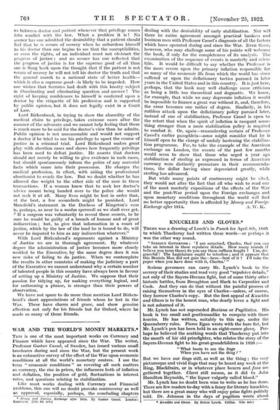WAR AND THE WORLD'S MONEY MARKETS.*
Tins is one of the most important works on Currency and Finance which have appeared since the War. The writer, Professor Gustav Cassel, of Sweden, has issued various small brochures during and since the War, but the present work is an exhaustive survey of the effect of the War upon economic conditions at all the world's monetary centres. I use the term " economic conditions " as covering all such matters as currency, the rise in prices, the influences both of inflation and deflation, the position of gold, fluctuations in interest rates, and questions relating to stabilization.
Like most works dealing with Currency and Financial problems, this one will no doubt provoke controversy as well as approval, especially, perhaps, the concluding chapters
• Menet; and Foreign Exchange after 1914. By Gustav Cassel. London• Constable. [10s. CAL net.] dealing with the desirability of early stabilization. Nor will there be entire agreement amongst practical bankers and business men with Professor Camel's diagnosis of all the factors which have operated during and since the War. Even those, however, who may challenge some of his points will welcome the book, if only for the completeness of its analysis. The examination of the sequence of events is masterly and scien- tific. It would be difficult to say whether the Professor is the more severe upon the primary inflation responsible for so many of the economic ills from which the world has since suffered or upon the deflationary tactics pursued in later years in the United States and in this country. It is just here, perhaps, that the book may well challenge some criticism as being a little too theoretical and dogmatic. We know, for example, that while we may deprecate inflation it would be impossible to finance a great war without it, and, therefore, the error becomes one rather of degree. Similarly, in his ruthless attack upon the deflationary policy pursued later, instead of one of stabilization, Professor Cassel is open to the retort that when the spirit of inflation is rampant some- thing stronger than a mere stabilization policy is required to combat it. Or, again—remembering certain of Professor Cassel's earlier pamphlets—some might consider that he is himself open to the charge of unduly hastening the stabiliza- tion programme. For, to take the example of the American exchange on London, the events of the past few months would seem to show that those who urged a year ago stabilization of sterling as expressed in terms of American currency were distinctly premature in their recommenda- tions, the dollar having since depreciated greatly, while sterling has advanced.
But while many points of controversy might be cited, they would not alter the fact that all who wish to read one of the most masterly expositions of the effects of the War and the post-War period upon the Foreign exchanges and upon monetary conditions throughout the world will find no better opportunity than is afforded by Money and Foreign










































 Previous page
Previous page